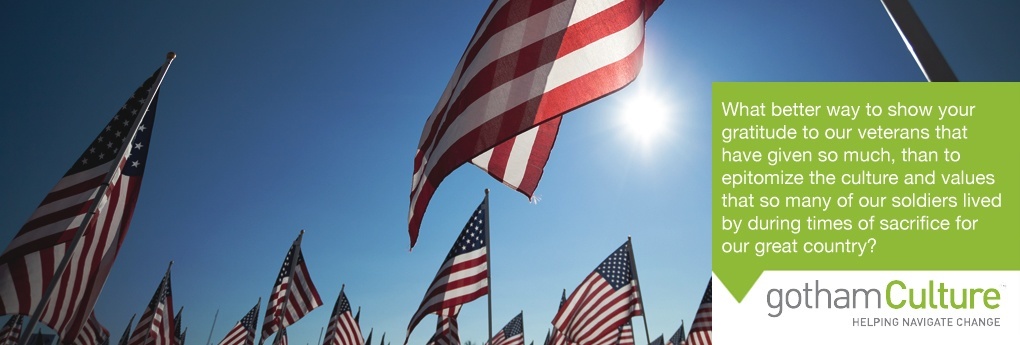Yesterday, on LinkedIn, I wrote an article highlighting our veterans, and how the US Army values of LDRSHIP (Loyalty, Duty, Respect, Selfless Service, Honor, Integrity and Patriotism) can, and should, apply to your personal and professional lives and the culture of every successful organization.
Ask yourself how your accomplishments or your company’s success would improve exponentially if only two or three of these seven values were a focus and priority of your business every day.
What better way to show your gratitude to our veterans that have given so much, than to epitomize the culture and values that so many of our soldiers lived by during times of sacrifice for our great country; these seven values of LDRSHIP.
We can learn quite a bit from these men and women in uniform. Successfully overcoming adversity through the war game soldiers must play, and the values and strategies they use to win that game, can excel company culture to heights of performance never imagined.
Imagine what a different world we’d live in if we truly incorporated the military’s Loyalty, Duty, Respect, Selfless Service, Honor, Integrity and Patriotism in our business strategies and operations? Or, if we committed to those values more in our daily lives at home with family and friends?
Talking about strategies for organizational change using these seven values is a powerful place from which to launch, learn and lead. And, it has been proven time and again in my own work with clients.
Learning from The Hero’s Journey
It’s not just these embedded cultural values that prepare veterans for success in today’s organizations. It is also their experience with the “Hero’s Journey,” what is termed the “monomyth” as introduced by Joseph Campbell:
“A hero ventures forth from the world of common day into a region of supernatural wonder: fabulous forces are there encountered and a decisive victory is won: the hero comes back from this mysterious adventure with the power to bestow boons on his fellow man.” – Campbell, Joseph. The Hero with a Thousand Faces. Princeton: Princeton University Press, 1949. p.23.
Because of their preparation and commitment to this model, veterans play an ever more important and unique variable in the success as part of, or the head of, any organization.
Let’s dig in a bit more:
In my work, I have come to see first hand that organizational strategy can become more relevant as real world scenarios are applied to its development. The Hero’s Journey model that our soldiers and Defense Department live by ensures that five crucial attributes for organizational strategy are included in the process. These include:
- PLANNING
- RESISTANCE
- TRIALS
- SUCCESS
- LESSONS LEARNED
Working with these five attributes creates a strategic planning process that is not linear, but circular and continuous. If you consider these five areas, team members start to think strategically in their own paradox, and not in a one-size-fits-all approach. The story of the Hero’s Journey is a framework that helps customize the process and the resulting solution. But, no step can be omitted in that journey.
Don’t Stop At Planning
Many organizations and leaders think that planning, the first attribute above, is the beginning and the end of their strategy.
However, you cannot reach success (success = achievable and high performing strategy) without trial and tribulation, as our solders and veterans will tell you. Those remaining four steps of the hero’s journey ensure the cycle of trial, failure and trial, failure is repeated until true success is achieved, defined, repeated and institutionalized.
Emerging strategies never intended or expected will come from the trials and lessons learned of failure. Strategy is an evolving, continuous, learning process that follows the hero’s journey.
Veterans In Organizational Change
No one knows this hero’s journey method better than our veterans. They have been to war, lost small battles, lost battle buddies, or lost understanding of the mission in times of intense stress or crisis. But they continue to move forward to test, adapt and overcome through trial and error. They ultimately define a new strategy or desired outcome of success for the environment they are in, based upon the trials and resistance they are up against.
Our veterans are well suited to be a part of, if not leading, organizational strategy development and accountability in our nation’s agencies and businesses. As we celebrate them today, companies should be seeing Veterans as incredibly attractive, qualified talent fully prepared to fill the leadership pipeline.
Where many organizations may have a void of talent, they should be seen as an absolute resource.
Veterans have embedded the “journey” framework of venturing forward without fear, learning from failure, and making change based on the wisdom of experience. Your organization can learn by studying up on that journey and hiring leaders who have lived it.
I would love to hear your thoughts and specific steps you are taking to embody and live these, or other, values in today’s business environment. Please leave a comment or connect with me on LinkedIn to keep the conversation going!

